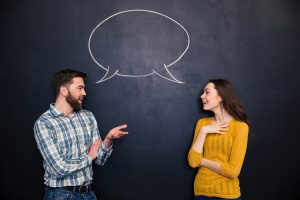Relationship Skills
 In her article “After the Honeymoon,” psychologist Donna Rockwell opens with the straightforward words, “Listen up. Marriage is hard work.” She then goes on to explore and explain just why this is and what couples can do about it. Yet, this simple directive alone – to “listen up” – is a good starting place for couples looking to learn new relationship skills to achieve lasting love. For most couples, the first step is to stop expecting a relationship to be perfect or easy and not to jump to the conclusion that it is the wrong relationship if there are struggles.
In her article “After the Honeymoon,” psychologist Donna Rockwell opens with the straightforward words, “Listen up. Marriage is hard work.” She then goes on to explore and explain just why this is and what couples can do about it. Yet, this simple directive alone – to “listen up” – is a good starting place for couples looking to learn new relationship skills to achieve lasting love. For most couples, the first step is to stop expecting a relationship to be perfect or easy and not to jump to the conclusion that it is the wrong relationship if there are struggles.
Relationships are complicated, because we are complicated. People come to a relationship carrying loads of internal baggage, battle scars from past hurts and defenses they’ve built up. These barriers can serve as obstacles on the road to getting close to someone else. Thus, falling in love can be about as frightening and uncertain as falling itself. So how can we get better at anticipating and coping with the inevitable struggles we will face in our relationships? How can we form the relationship skills required to get the utmost pleasure and fulfillment from sharing our lives with someone we love? I’ve asked Dr. Lisa Firestone, psychologist and author of Sex and Love in Intimate Relationships to help answer this question.
What Relationship Skills Lead to Lasting Love?
Non-defensiveness – Being open to feedback is one of the greatest relationship skills you can offer to your partner, and it is a great asset to any relationship. Instead of instinctively defending against any criticism or suggestion your partner may have, look for the kernel of truth in what he or she has to say. This creates an opportunity for change. Plus, the more open you are to hear what they have to say, the more likely they will be to reciprocate.
Openness to new experiences – Relationships don’t exist in a vacuum. Yet, all too often, we use our relationships to make our worlds smaller and smaller, to do less and less and to fall into deadening routines. Spending time together, taking chances and trying new things create a lively, energetic environment for a relationship to thrive.
Open communication – Communication (or lack of communication and miscommunication) can become a real issue in most relationships. In today’s world, new forms of communication like text or email have, in many ways, even further complicated the back-and-forth between couples, creating more suspicion and less directness and honesty. It is all too easy to misinterpret or read into these forms of communication. Being willing and able to voice your emotions in an honest and mature way is among the most important relationships skills a person can have. When you allow your partner to really know you, you can achieve mutual understanding. It is also important to develop your ability to draw your partner out, to really listen to what they are saying and make them feel known by you.
Just because you know your partner, don’t assume you know everything they’re thinking. Really try to hear how partner experiences a situation. Try to put yourself in their shoes and understand their perceptions, feelings and reactions. It is always important to respect that they have a sovereign mind that may see and experience the world differently than yours.
Honesty – Being honest is truly a skill set, because you have to know yourself well enough to know what’s honest. Picking at your partner in the name of honesty may be serving the function of creating emotional distance between you. On the other hand, it’s important not to use deception to avoid conflict. Lying is a very slippery slope; it has the tendency to snowball out of control. It is immoral to play games with another person’s reality. Lying only leads to distance and distrust, and closeness and trust are essential to a healthy relationship.
Optimism – Being optimistic is a notable relationship skill and life skill for that matter. It’s valuable to look for the good in people and situations and most importantly in yourself. Growing cynical only leaves you feeling miserable. Keeping a positive outlook leads to much better outcomes.
Calmness – Being able to calm yourself down is another great relationship skill to have. Couples often tumble into trouble when they allow themselves to be dramatic and reactive in the moment based on intense emotions. When you develop your ability to take time to slow down your thoughts and reflect on the situation, you can gain perspective. This will allow you to have fewer of those heated moments that escalate into hurtful behavior. When you take time to calm down within yourself, you can react in a way that’s much more productive, communicating clearly, maintaining your compassion and acting with integrity.
How Can I Build These Relationship Skills in Myself?
You can always develop yourself and your capacity to be a loving person. It’s never too late to work on yourself or develop yourself in a relationship. Challenging and changing your contribution to relationship difficulties should feel empowering, since you are the only person you completely control. You can make yourself a better relationship partner by being more expressive and taking chances with your partner. You can get to know your inner critic and the thought processes or “defenses” that keep you from achieving your goals. You can learn how to calm yourself down before reacting using mindfulness techniques in moments of stress. You can take a serious interest in getting to know yourself, your wants and motivations and learn more about yourself. One avenue to achieve this self-knowledge is to solicit input from trusted friends. This can be a first step, allowing you to be more honest with yourself and your partner and more authentic in your relationship.
What Elements Prevent Us from Attaining These Relationship Skills?
Relationship skills aren’t something we’re born with or learn in school. Like most skills, we learn through experience, through our relationships. Growing up, we may never have learned healthy ways to cope, handle conflict or express ourselves. In fact, we may have learned just the opposite. The worst enemy of our relationship is our past. Poor role models and hurtful early relationship experiences leave a lasting impression. In addition, we have likely formed destructive adaptations, defenses and “critical inner voices” that were necessary when we were young but now keep us from developing and maintaining closeness and true intimacy with our romantic partners. We can change this by looking for new role models in couples or individuals who we admire. We can adopt as our own the styles of relating we observe that resonate with how we want to be in our relationships. We can set personal goals for ourselves and try to challenge and change behavior that is self-limiting or that actually sabotages our relationships.
How Can I Encourage My Partner to Work on His or Her Relationship Skills?
The only person you can change is you. It’s better to focus on yourself. Ask yourself, what do I do the moment before my partner does the things that frustrate me most? This attitude isn’t about blaming yourself or ignoring your partner’s real flaws, but it’s about taking control of any quality in yourself that is hurtful to your relationship. If you are open to changing yourself – if you show up for your partner and show love to your partner – you are much more likely to draw an open and loving response from your partner. Unilateral disarmament is an exercise I often advise couples to engage in; when you feel hurt by your partner and feel like lashing back, reach out instead and express your desire to be close to them. Just drop your engagement in the fight, calm yourself down and try to approach the situation with love, compassion and respect for both yourself and your partner. Use the moment to show that you value the relationship more than being right or protecting yourself. Don’t build a case against your partner or yourself for that matter. This vulnerable stance also often evokes a loving response from your partner. When you are open and vulnerable, your partner is much more likely to reciprocate.
Tags: relationship advice, relationship problems, relationship tips, relationships skillsOne Comment
Leave a Reply
You must be logged in to post a comment.










and relationship skills are definitely important I entered my first relationship as a novice and came out an expert